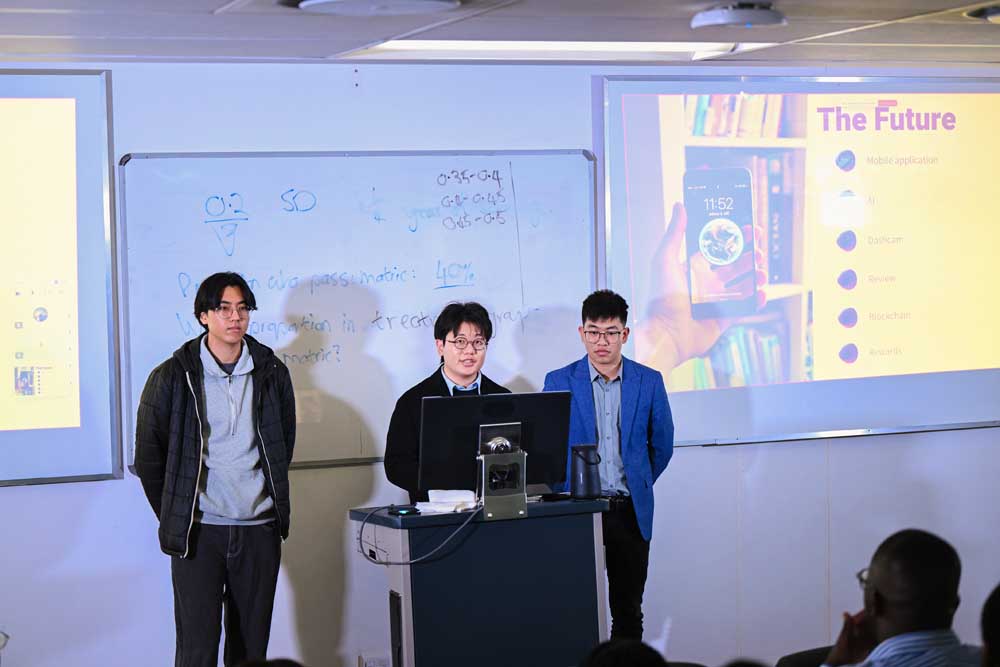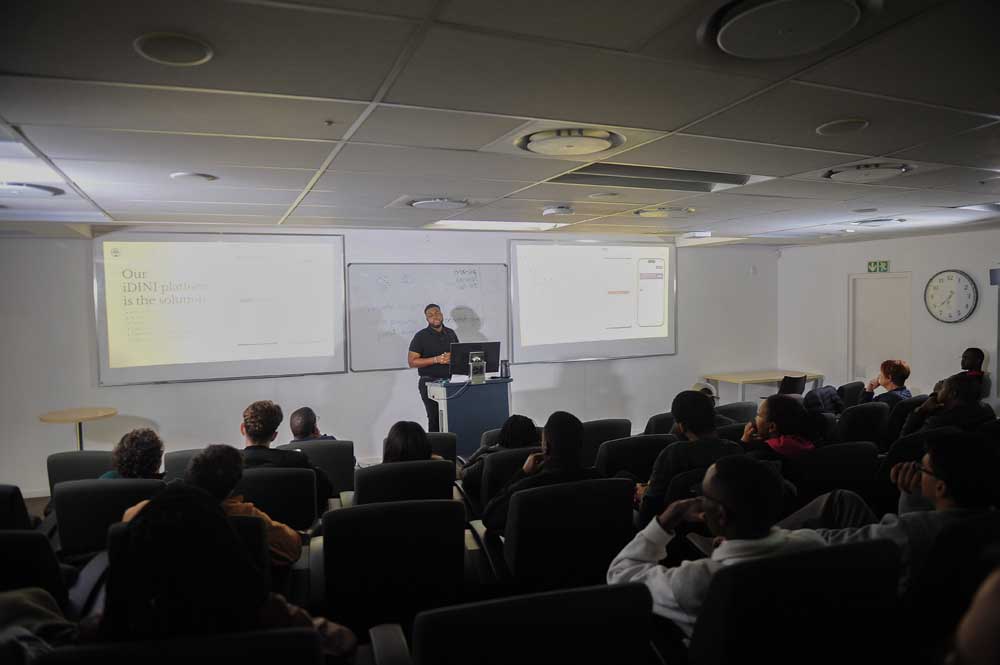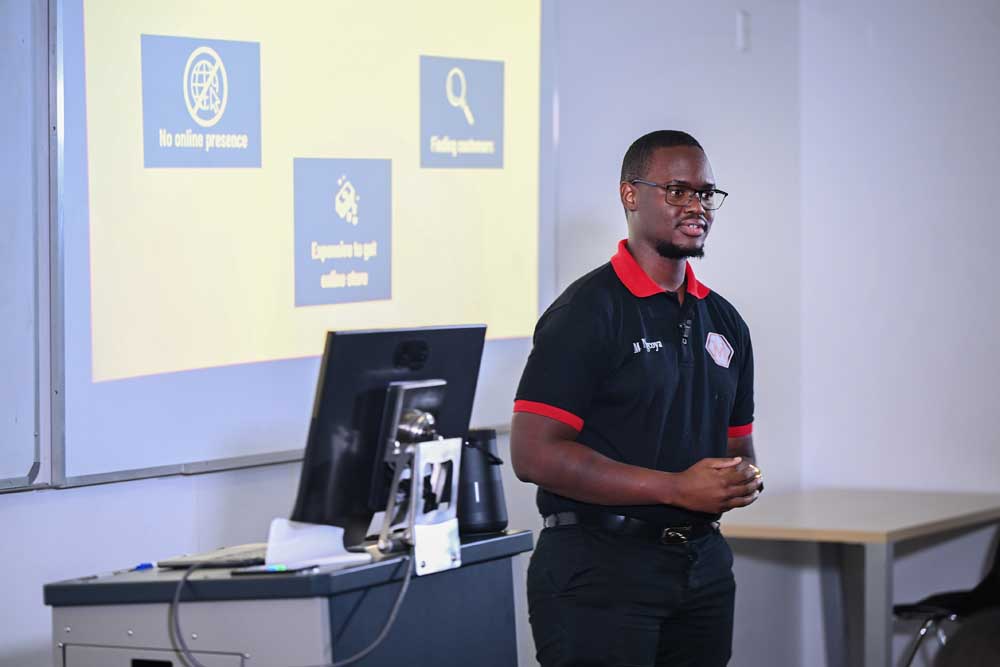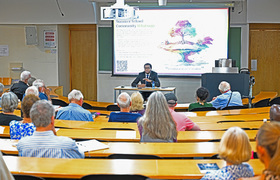Students sharpen entrepreneurial ambitions
27 June 2025 | Story Kamva Somdyala. Photos Lerato Maduna. Read time 6 min.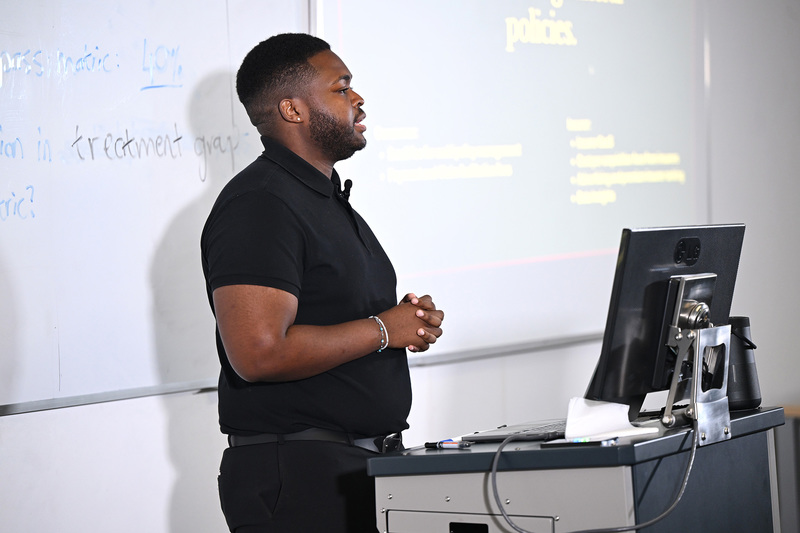
Students with innovative, entrepreneurial ideas were put through their paces on Friday, 20 June, as part of the GenesisBloc Launchpad, as they presented initial pitches, fielded questions and went away with rich feedback to refine their ideas.
The event, hosted by the University of Cape Town’s (UCT) Financial Innovation Hub, was an evening of research, presentation and thinking on the spot in the presence of their mentors, competition, team members and peers. UCT News was there to capture the Shark Tank-esque presentations.
GenesisBloc’s space on the UCT campus is dedicated to fostering entrepreneurial exploration beyond traditional academic settings. This pre-incubator creates forums for idea exchange, connecting students with start-ups, experts, mentors, and collaborators. Ideas ranged from plugging the “invisible ledger” income stream, expert witnesses and a vibrant marketplace.
First to present was IWitnessroads, aimed at road safety. It is a platform to enable citizens to monitor and discourage traffic violations. “Globally, there are 20 to 50 million traffic injuries every year. Additionally, 1.2 million people die every year from traffic incidents. From our survey, over 80% of people see traffic violations every day; the most being speeding, reckless driving and red light jumping. In our survey, 50% of the people said they don’t know where or how to report traffic violations,” said founder, Ben Yu.
“The average household has three to five policies, often with one person managing them all.”
Darryl Nyamayaro represented iDini, a platform for an all-in-one insurance policy management, where people can manage their funeral policies from one dashboard. “The biggest problem is that there is a 55% chance someone’s policy will lapse within a year, and this means they will miss a payment, rendering their policy null and void; therefore, people need a central, personalised and accurate dashboard to help them manage their policies. The average household has three to five policies,” said Nyamayaro.
“Through research, we saw that people would love the option to pay months in advance or to be able to use different payment methods. The challenge is that people fear faceless contact. People can manage and view all their policies on one platform, track status and get payment alerts. Artificial intelligence (AI) would come in handy where people chat with a chatbot about their policies.”
Mpilonhle Ngcoya presented Makethe, a marketplace dedicated to UCT, which gives businesses that sign up their own digital storefront and allows them to get access to markets and book services directly on the platform, as well as buy products. “Our target market is student councils, student societies and house committees, and these are classified as verified businesses. Student businesses would fall under “unverified”. We did a test over 10 days and over 27 transactions took place. There are currently 354 users on the platform; 285 businesses. There are safety mechanisms in place to safeguard against scammers,” said Ngcoya.
Low trust in institutions
To reduce the time it takes to connect expert witnesses with law firms, Marc Levin has come up with Case Cleared – a searchable, data-driven marketplace for expert witnesses. “Case Cleared relies on four core tenets: searching and filtering; credibility badges; witness networking features; and smart matching and workflow tools. We aim to layer in paid visibility and workflow upgrades once we reach critical mass, which is about 300 to 500 experts,” said Levin.
SisoNova’s Jason Joannou expressed the fear of leaving behind an enormous grouping of people who are not recognised by traditional financial institutions. For example, informal traders. “There are over 20 million people in South Africa who are not banked or underbanked. Why? There is low trust in institutions, high documentation requirements, cash resilience, digital access is expensive and intimidating; however, people are transacting daily, just outside the system and this creates an invisible ledger where there’s no credit history, no access to loans and no what to prove your worth or how you want to grow.”
“The insight we arrived at is that banks do not have the right data.”
Joannou added: “The root cause of the problem is that financial systems were built for products and compliance – not for people and their realities. Turning the challenge into opportunity is recognising that SisoNova is a bridge to recognition and financial growth. SisoNova provides three main services: personal, business, and public. Personal is for individual expense tracking. Business is for small businesses to track finances and growth, and public is for public financial resources (loan, bank account) and access to the marketplace.”
Ali Ndlovu and his team were last to present. They introduced Brown Financial Services which builds financial products e-hailing drivers can use and repay.
“The insight we arrived at is that banks do not have the right data. They only see fragments of the driver’s income, but the model does not consider irregular earnings. The only way to serve this segment is to build products around their cashflow. So our product is a prepaid fuel card designed for gig workers: it gives them credit when they need it and cash back on every rand they spend on fuel. We also have add-ons like insurance and remittances via one mobile app.”
To put it to the test, they have onboarded 110 drivers and issued over R200 000 in loans. Eighty percent of the drivers they onboarded took out a second loan and their default rate is under 5%.
Teams will continue to finetune their ideas over the course of the next couple of months.
 This work is licensed under a Creative Commons Attribution-NoDerivatives 4.0 International License.
This work is licensed under a Creative Commons Attribution-NoDerivatives 4.0 International License.
Please view the republishing articles page for more information.


